新概念英语第二册笔记81课
- 格式:doc
- 大小:656.00 KB
- 文档页数:9
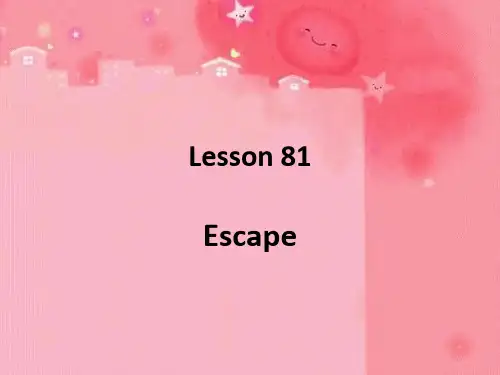

新概念册二81课1.prisoner n. 囚犯;犯人take sb.prisoner 俘虏某人prison监狱The prisoner planned to escape but failed.那些囚犯曾计划逃没有成功eg:When he had killed the guard ,the prisoner of war quickly dragged him into the bushes.那个战俘杀死卫兵以后,迅速地把尸体拖进了灌木从。
bush n.灌木;矮树•a clump of bushes 一片灌木林/a rose bush 玫瑰林•around(about)the bush旁敲侧击,拐弯抹角;beat the bush到处搜寻rapidly adv.快,迅速的•He speaks rapidly.他说得很快。
•rapid adj.快速的,敏捷的;a rapid stream 急流/a rapid worker工作快速的人uniform n.制服,军服//adj 一致的,一样的,不变的•a uniform 学校制服•in full uniform穿着一套军礼服;out of uniform 穿着便衣rifle n.来福枪,步枪•hunting rifle猎枪•machine gun 机枪shoulder n.肩膀,肩部•sloping shoulder削肩/square shoulder平肩•she looked over her shoulders.你要自己负起责任来。
•head and shoulder above 远胜于•rub shoulders with与.....为伍•give someone the cold shoulder冷淡的对待(某人)march vi/vt齐步走,正步走•The soldiers marched along the street.士兵们行进在街道上。
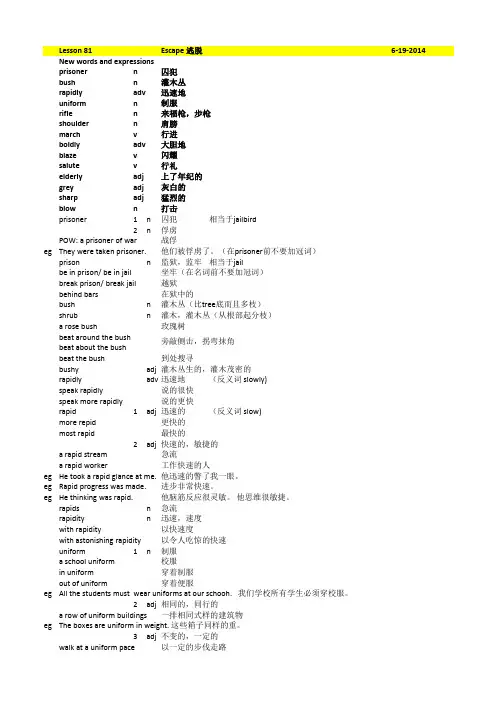
Lesson 816-19-2014New words and expressions prisoner n 囚犯bush n 灌木丛rapidly adv 迅速地uniform n 制服rifle n 来福枪,步枪shoulder n 肩膀march v 行进boldly adv 大胆地blaze v 闪耀salute v 行礼elderly adj 上了年纪的grey adj 灰白的sharp adj 猛烈的blow n 打击prisoner 1n 囚犯相当于jailbird 2n 俘虏POW: a prisoner of war 战俘egThey were taken prisoner.他们被俘虏了。
(在prisoner 前不要加冠词)prison n 监狱,监牢相当于jail be in prison/ be in jail 坐牢(在名词前不要加冠词)break prison/ break jail 越狱behind bars 在狱中的bush n 灌木丛(比tree 底而且多枝)shrub n 灌木,灌木丛(从根部起分枝)a rose bush 玫瑰树beat around the bush beat about the bush beat the bush 到处搜寻bushy adj 灌木丛生的,灌木茂密的rapidly adv 迅速地(反义词 slowly)speak rapidly 说的很快speak more rapidly 说的更快rapid 1adj 迅速的(反义词 slow)more repid 更快的most rapid 最快的2adj 快速的,敏捷的a rapid stream 急流a rapid worker 工作快速的人egHe took a rapid glance at me. 他迅速的瞥了我一眼。
egRapid progress was made.进步非常快速。
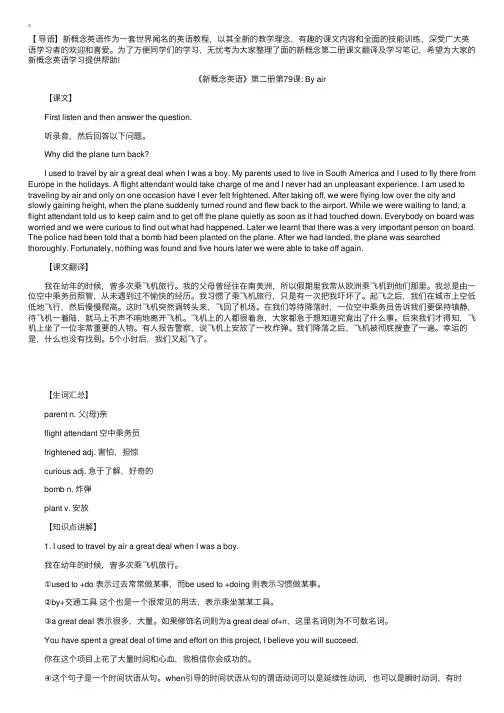
【导语】新概念英语作为⼀套世界闻名的英语教程,以其全新的教学理念,有趣的课⽂内容和全⾯的技能训练,深受⼴⼤英语学习者的欢迎和喜爱。
为了⽅便同学们的学习,⽆忧考为⼤家整理了⾯的新概念第⼆册课⽂翻译及学习笔记,希望为⼤家的新概念英语学习提供帮助!《新概念英语》第⼆册第79课: By air【课⽂】First listen and then answer the question.听录⾳,然后回答以下问题。
Why did the plane turn back?I used to travel by air a great deal when I was a boy. My parents used to live in South America and I used to fly there from Europe in the holidays. A flight attendant would take charge of me and I never had an unpleasant experience. I am used to traveling by air and only on one occasion have I ever felt frightened. After taking off, we were flying low over the city and slowly gaining height, when the plane suddenly turned round and flew back to the airport. While we were waiting to land, a flight attendant told us to keep calm and to get off the plane quietly as soon as it had touched down. Everybody on board was worried and we were curious to find out what had happened. Later we learnt that there was a very important person on board. The police had been told that a bomb had been planted on the plane. After we had landed, the plane was searched thoroughly. Fortunately, nothing was found and five hours later we were able to take off again.【课⽂翻译】我在幼年的时候,曾多次乘飞机旅⾏。
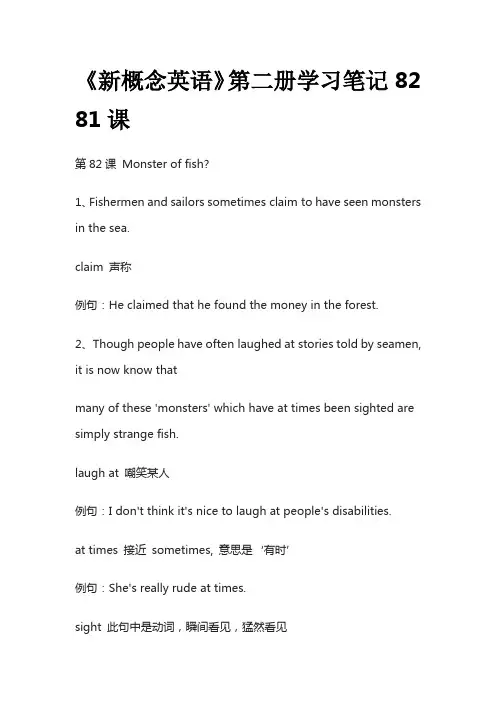
《新概念英语》第二册学习笔记82 81课第82课Monster of fish?1、Fishermen and sailors sometimes claim to have seen monsters in the sea.claim 声称例句:He claimed that he found the money in the forest.2、Though people have often laughed at stories told by seamen, it is now know thatmany of these 'monsters' which have at times been sighted are simply strange fish.laugh at 嘲笑某人例句:I don't think it's nice to laugh at people's disabilities.at times 接近sometimes, 意思是‘有时’例句:She's really rude at times.sight 此句中是动词,瞬间看见,猛然看见例句:The missing woman has been sighted in the Birmingham area.3、Realizing that this was no ordinary fish...此句通常的说法是:Realizing that this was not an ordinary fish...这两种方式表达的意思完全相同,可以互换。
4、...it was found to be over thirteen feet long.英语中‘数词+计量名词+形容词’的表达方法很常见,例词:10 meters wide12 inches high6 feet tall7 years old5、注意如下句子中sea 的用法:(1)Fishermen and sailors sometimes claim to have seen monsters in the sea. (在海上)(2) ...unusual creatures are...rarely caught out at sea. (在大海深处)(3) A small fishing boat was carried miles out to sea. (表示往大海深处推的方向感,不同于out at sea 这种静止状态)6、语态是动词的一种形式,用来说明主语和谓语动词之间的关系,英语中的动词有两种基本语态:主动语态和被动语态。
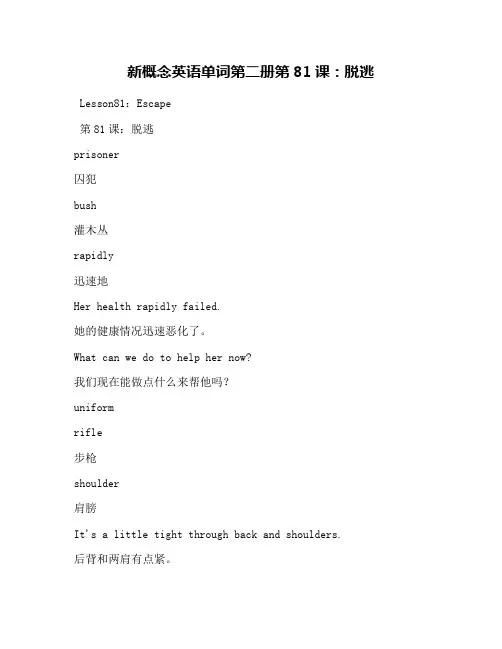
新概念英语单词第二册第81课:脱逃 Lesson81:Escape第81课:脱逃prisoner囚犯bush灌木丛rapidly迅速地Her health rapidly failed.她的健康情况迅速恶化了。
What can we do to help her now?我们现在能做点什么来帮他吗?uniformrifle步枪shoulder肩膀It's a little tight through back and shoulders.后背和两肩有点紧。
I can let out a bit at the back and shoulders.我能够把后背和两肩放出一点。
march行进boldly大胆地Speakit out boldly.大胆地说出来。
Whatever l will say must be kept secret.我接下来说的话必须保密。
blaze火焰salute行礼elderly上了年纪的His eldedy mother is always missing him他上了年纪的母亲时刻惦念着他。
How often does he go back to see his mother then?那他多长时间回去看一次他的母亲?grey灰白的sharp尖头,骗子It couldn’t stand such a sharp blow.它经受不住这么猛烈的敲击。
Sorry, but can you tell me what should I do instead of that?对不起,但是你能否告诉我我应该怎么做?blow打击。
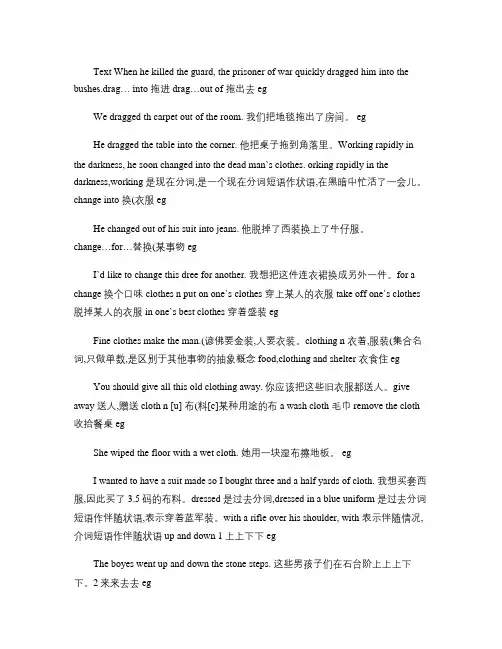
Text When he killed the guard, the prisoner of war quickly dragged him into the bushes.drag… into 拖进drag…out of 拖出去egWe dragged th carpet out of the room. 我们把地毯拖出了房间。
egHe dragged the table into the corner. 他把桌子拖到角落里。
Working rapidly in the darkness, he soon changed into the dead man`s clothes. orking rapidly in the darkness,working 是现在分词,是一个现在分词短语作状语,在黑暗中忙活了一会儿。
change into 换(衣服egHe changed out of his suit into jeans. 他脱掉了西装换上了牛仔服。
change…for…替换(某事物egI`d like to change this dree for another. 我想把这件连衣裙换成另外一件。
for a change 换个口味clothes n put on one`s clothes 穿上某人的衣服take off one`s clothes 脱掉某人的衣服in one`s best clothes 穿着盛装egFine clothes make the man.(谚佛要金装,人要衣装。
clothing n 衣着,服装(集合名词,只做单数,是区别于其他事物的抽象概念food,clothing and shelter 衣食住egYou should give all this old clothing away. 你应该把这些旧衣服都送人。
give away 送人,赠送cloth n [u] 布(料[c]某种用途的布a wash cloth 毛巾remove the cloth 收拾餐桌egShe wiped the floor with a wet cloth. 她用一块湿布擦地板。

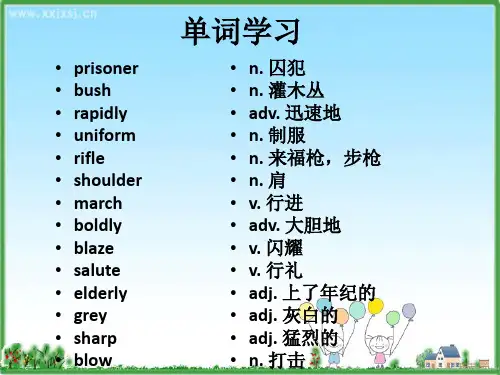
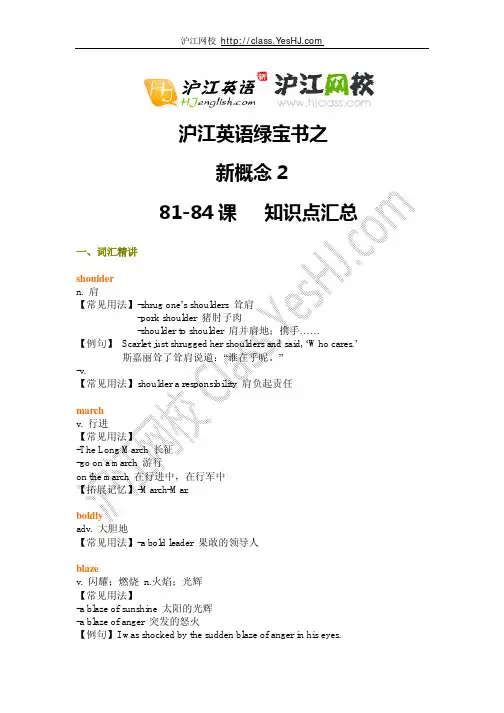
沪江英语绿宝书之新概念281-84课知识点汇总一、词汇精讲shouldern. 肩【常见用法】-shrug one’s shoulders 耸肩-pork shoulder 猪肘子肉-shoulder to shoulder 肩并肩地;携手……【例句】Scarlet just shrugged her shoulders and said, ‘Who cares.’斯嘉丽耸了耸肩说道:“谁在乎呢。
”-v.【常见用法】shoulder a responsibility 肩负起责任marchv. 行进【常见用法】-The Long March 长征-go on a march 游行on the march 在行进中,在行军中【拓展记忆】-March-Mar.boldlyadv. 大胆地【常见用法】-a bold leader 果敢的领导人blazev. 闪耀;燃烧n.火焰;光辉【常见用法】-a blaze of sunshine 太阳的光辉-a blaze of anger 突发的怒火【例句】I was shocked by the sudden blaze of anger in his eyes.他眼中突发的怒火令我震惊。
elderlyadj. 上了年纪的【常见用法】an elderly lady 老妇人the elderly 老人【词义辨析】-elderly & olda. elderly 仅指人b. elderly 更礼貌c. elder不与than连用【拓展记忆】-eldest adj. 年龄最大的【例句】I’m the eldest among the three sisters.我是三姐妹中年级最大的。
sharpadj. 尖锐的;刺耳的;明显的;剧烈的【常见用法】-a sharp knife 尖刀----a blunt knife 钝刀-in sharp contrast with/to 墙裂对比【例句】Black is in sharp contrast with white.黑与白形成鲜明对比。
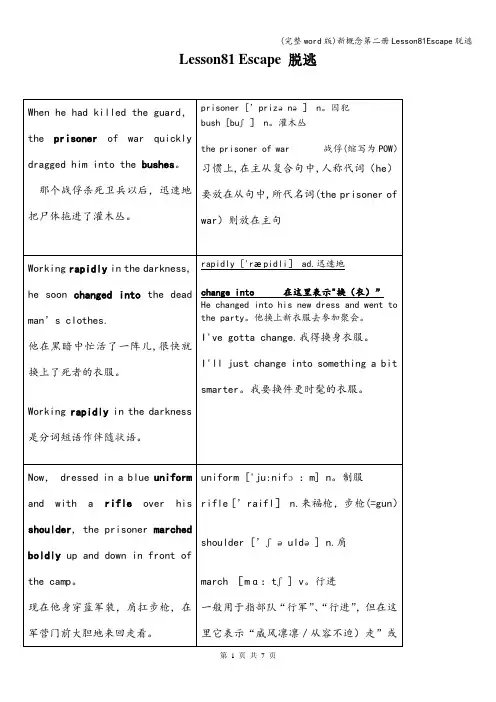
Lesson81 Escape 脱逃the elderly:老年人an elderly lady with white hair:白发老妇人grey [grei] a。
灰白的The prisoner felt sorry for him,but there was nothing else hecould do.战俘为他感到惋惜,但却没有别的选择。
feel sorry for:As the man came near,the prisoner knocked him to the ground with a sharp blow. Then,jumping into the car, he drove off as quickly as he could。
当这个人走近时,战俘一拳把他打倒在地,然后跳进车里,以最快的速sharp a.猛烈的a sharp frost:刺骨的寒霜a sharp pain in my back:背部一阵巨痛blow [bləu] n.打击a heavy blow to the head当头一棒soften the blow:减轻打击blow away:吹散1 prisoner [’prizənə] n.囚犯2 bush [buʃ] n.灌木丛3 rapidly [’ræpidli] ad.迅速地4 uniform [’ju:nifɔ:m] n.制服5 rifle ['raifl] n.来福枪,步枪6 shoulder ['ʃəuldə] n.肩7 march [mɑ:tʃ] v。
行进8 boldly [’bəuldli] ad.大胆地9 blaze [bleiz] v。
闪耀10 salute [sə'lu:t] v。
行礼11 elderly ['eldəli] a.上了年纪的12 grey [grei] a。
灰白的13 sharp [ʃɑ:p] a.猛烈的14 blow [bləu] n。
新概念英语第二册课后习题答案详解Lesson 81练习答案Key to written exercises1.难点练习答案1 saluted2 clear3 cloth4 clothes5 greeted2.多项选择题答案1. d根据课文第5-7行He could hear shouting in the camp itself…they had just discovered that a prisoner had escaped, 可以判断出只有d.与课文内容相符,其他3个选择都与课文内容不符,所以选d。
2. a根据课文第9行The officers got out and the prisoner stood to attention and saluted as they passed (军官们一定是把俘虏当成了看守或卫兵),可以判断只有a. a guard (卫兵)是正确的,而其他3个选择都不是课文所暗示的情形,所以应该选a.3. a该句需要一个同前一句以when 引导的时间从句含义相同的短语.b. when killing 和c. when having killed 都不合乎语法,因为when 是连词,而不是介词,它后面一般要跟从句,而不能跟名词性短语.a. On having killed (当杀死……的时候)和d. ON having been killed(当……被杀后)要注意:以介词on 引导的动名词短语可以表示时间,可以代替when 引导的时间从句,但是d.表示被动的含义,与该短语的逻辑主语he 不符合,只有a.表示主动意义与前一句的时间从句意思相同,所以选a.4. d本句的意思是“(汽车里)有几个军官”。
英语里表示“某处有什么”应该用there is 或there are . a. They had 和b. there had 都不合乎题目意思和语法规则;c. There was 也不符合语法,因为句子的主语是复数形式(officers), 应该用there were 才正确,所以只有选d. There were.5. b该句需要选一个与前句中的as they passed (当他们经过的时候)含义相同的时间从句。
新概念英语第二册逐句精讲语言点第81课(2)新概念英语第二册逐句精讲语言点第81课(2)Lesson 81 Escape 脱逃When he had killed the guard, the prisoner of war quickly dragged him into the bushes. Working rapidly in the darkness, he soon changed into the dead man's clothes. Now, dressed in a blue uniform and with a rifle over his shoulder, the prisoner marched boldly up and down in front of the camp. He could hear shouting in the camp itself. Lights were blazing and men were running here and there: they had just discovered that a prisoner had escaped. At that moment, a large black car with four officers inside it, stopped at the camp gates. The officers got out and the prisoner stood to attention and saluted as they passed. When they had gone, the driver of the car came towards him. The man obviously wanted to talk. He was rather elderly with grey hair and clear blue eyes. The prisoner felt sorry for him, but there was nothing else he could do. As the man came near, the prisoner knocked him to the ground with a sharp blow. Then, jumping into the car, he drove off as quickly as he could.句子讲解:5、Lights were blazing and men were running here and there:they had just discovered that a prisoner had escaped.军营里灯火通明,人来人往--他们刚刚发现有一个战俘失踪了!语言点 run here and there跑来跑去6、At that moment, a large black car with four officers inside it stopped at the camp gates.正在此时,一辆黑色大轿车停在了军营门口,里面坐了4个军官。
新概念英语第二册Lesson79~81学习笔记新概念英语第二册Lesson79学习笔记1. I used to travel by air a great deal when I was a boy.我在幼年的时候,曾多次乘飞机旅行。
①used to +do 表示过去常常做某事,而be used to +doing 则表示习惯做某事。
②by+交通工具这个也是一个很常见的用法,表示乘坐某某工具。
③a great deal 表示很多,大量。
如果修饰名词则为a great deal of+n,这里名词则为不可数名词。
You have spent a great deal of time and effort on this project, I believe you will succeed.你在这个项目上花了大量时间和心血,我相信你会成功的。
④这个句子是一个时间状语从句。
when引导的时间状语从句的谓语动词可以是延续性动词,也可以是瞬时动词,有时when就表示“就在那时”。
如:When I studied in the library, She called me.我在图书馆学习的时候她给我来电话了。
2. take charge of 照管,负责,担任in charge of 管理,负责照料 in the charge of 由……照顾Don't worry, I will take charge of the baby when you are away.别担心,你不在的时候我会照顾好孩子的。
3. After taking off, we were flying low over the city and slowly gaining height, when the plane suddenly turned round and flew back to the airport.起飞之后,我们在城市上空低低地飞行,然后慢慢爬高。
新概念英语第二册Lesson79学习笔记1. I used to travel by air a great deal when I was a boy.我在幼年的时候,曾多次乘飞机旅行。
①used to +do 表示过去常常做某事,而be used to +doing 则表示习惯做某事。
②by+交通工具这个也是一个很常见的用法,表示乘坐某某工具。
③a great deal 表示很多,大量。
如果修饰名词则为a great deal of+n,这里名词则为不可数名词。
You have spent a great deal of time and effort on this project, I believe you will succeed.你在这个项目上花了大量时间和心血,我相信你会成功的。
④这个句子是一个时间状语从句。
when引导的时间状语从句的谓语动词可以是延续性动词,也可以是瞬时动词,有时when就表示“就在那时”。
如:When I studied in the library, She called me.我在图书馆学习的时候她给我来电话了。
2. take charge of 照管,负责,担任in charge of 管理,负责照料 in the charge of 由……照顾Don't worry, I will take charge of the baby when you are away.别担心,你不在的时候我会照顾好孩子的。
3. After taking off, we were flying low over the city and slowly gaining height, when the plane suddenly turned round and flew back to the airport.起飞之后,我们在城市上空低低地飞行,然后慢慢爬高。
①这是一个after引导的时间状语从句,表示主句动作fly发生在从句动作take off之后。
新概念第二册Lesson 81 Escape一、单词精讲prisoner n. 囚犯引申:可引申为失去自由、被限制的人,也可象征被某种困境束缚的人,如“a prisoner of war”(战俘)可引申为战争中的受困者。
搭配:political prisoner(政治犯);prisoner of conscience(良心犯);take sb. prisoner(俘虏某人)。
例句:The soldiers took many prisoners during the battle.(士兵们在战斗中俘虏了许多敌人。
)词源:来自“prison”(监狱),加上“-er”表示人,源自古法语“prison”,最终源自拉丁语“prensio”,表示抓住、监禁。
bush n. 灌木丛引申:可引申为隐蔽之处、藏身之所,因为灌木丛可以提供掩护。
搭配:rose bush(玫瑰丛);bush fire(丛林大火);beat about the bush(旁敲侧击)例句:The little rabbit hid in the bush.(小兔子躲在灌木丛里。
)rapidly adv. 迅速地引申:可引申为急促地、匆忙地,表示事情发展的速度很快且有一定的紧迫感。
搭配:increase rapidly(迅速增长);change rapidly(迅速变化);run rapidly (快速奔跑)例句:The population of the city is increasing rapidly.(这个城市的人口正在迅速增长。
)词源:来自“rapid”(迅速的),加上“-ly”构成副词,“rapid”源自拉丁语“rapidus”,表示迅速的、急促的。
uniform n. 制服引申:可引申为统一的、一致的象征,除了指服装的统一,也可表示标准、规则等的统一。
搭配:school uniform(校服);military uniform(军装);uniform color(统一的颜色)。
Lesson 81 Escape 脱逃New words and expressions1. prisoner(1)n. 囚犯 jailbird(2) n. 俘虜POW:a prisoner of war 戰俘They were taken prisoner . 他們被俘prison 监牢。
监狱(jail)be in prison = be in jail 坐牢←→break prison = break jail 越獄behind bard 在獄中2. bush n. 灌木丛(比tree低而且多枝)shrub 灌木丛;beat around the bush = beat about the bush 绕圈子说话,转弯抹角说话beat the bush 到处搜寻; bushy adj. 灌木丛的,茂密的3. rapidly adv. 迅速地(反义词slowly)speak rapidly 迅速地說; speak more rapidly更迅速地說rapid -----slow(2)rapid adj. 快速的、敏捷的a rapid stream 急流; a rapid worker 工作快速的人He took a rapid glance at me . 他快速的看了我一眼。
Her thinking was rapid . 她的脑筋反应很灵敏4. uniform (1) n. 制服a school uniform 校服; in uniform 穿着制服out of uniform 穿着便服All the students must wear uniforms at our school.在我們的學校所有學生必須穿校服5. rifle n. 来福枪,步枪hunting rifle 猎枪; trigger 扳机barrel 桶;筒,枪管; gun 枪、炮machine gun 机关枪; pistol 手枪6. shoulder(1)n. 肩膀sloping shoulder斜肩; square shoulder平肩She looked over her shoulder . 她回过头向后看Take the responsibility on your shoulders . 你要自己負起責任來。
(2)肩部、路肩、肩the shoulder of a mountain 山肩the shoulder of a vase 花瓶的肩部cry on one’s shoulder向某人哭訴give someone the shoulder 冷淡地對待某人shoulder to shoulder 肩並肩shrug one’s shoulders 聳肩7.march (1)v. 行进、進軍The troop marched along the street . 部队沿着街道行进(2) n. 行进。
进军a day’s march 一日行军; a line of march 行军路线(3) n. 音乐进行曲a wedding march 婚礼进行曲a death march 送葬曲、哀乐= a funeral march葬礼进行曲March 3 月(遊羅馬神話中戰神mars 之月而來)8.boldly adv. 大胆地、厚颜无耻bold (1) adj. 大胆的、不知害怕的、有勇气的coward adj. 胆怯的、懦弱的timid adj. 胆怯的、羞怯的a bold idea 大胆的想法; a very bold action 大胆的行动bold to do sth 胆敢做某事It is bold of sb to do sth 某人真大胆,竟然敢做……You’re bold to climb that mountain alone .= It is bold of you to climb that mountain alone .(2)adj. (女性)厚颜无耻、冒失的What a bold woman she is !9. blaze(1)v. 燃燒、冒火焰The fire blazed all day . 火烧了一整天。
The noon sun blazed in the sky . 中午的太阳在天空中閃耀(2)v. 发怒、愤怒He was blazing with anger. 他怒火中燒。
(3) n. 火焰、火苗The fire burst into a blaze . 火燒得通紅。
She was rescued from the blaze. 她被从大火中救出。
blazing adj. 炎熱的 a blazing sun 炙热的太阳10.salute(1)v. 行礼、敬礼,问候salute the flag 向旗帜敬礼give a salute 敬礼The officer returned the sergeant’s salute . 军官向中士敬了礼salutation n. 招呼, 致敬,11.elderly adj. 上了年纪的an elderly gentleman 上了年紀的紳士elder = older(美)one’s elder brother / sisteran elder son 年紀较長的兒子12.grey(1)adj. 灰白的(gray)She has gray eyes . 她有灰色的眼睛(2)阴暗的。
灰暗的His future is gray . 他的未來是陰暗的gray weather 阴天;12. sharp(1)adj. 猛烈的、凜冽的He was attacked by a sharp pain in his stomach . 他感到胃部剧痛a sharp wind 刺骨的寒风(2) adj.(刀口等)鋒利的、锐利的(反义詞blunt , dull)a sharp knife 鋒利的刀(3) adj. 呈锐角的、陡的He made a sharp turn to the right . 他向右急转(4) adj. 尖酸、刻薄的sharp words n. 忿怒的話(激动的話) ; a sharp tongue言語尖刻(5) adj. 敏銳的、靈敏的、聰明的、狡猾的反義詞 dullDogs have sharp ears . 狗有敏銳的耳朵 a sharp politician 精明的政治家clever gifted 有天分的; clever talented 有才能的clever smart 伶俐的; clever sharp 精明的sharpen. V. 削尖、使變尖銳的sharpen a pencil with a knife 用刀子削一削鉛筆sharp-eyed adj. 洞察力敏銳的sharply adv.13. blow(1)n. 打击、毆打He gave me a blow on the head . 他打在我头上= He struck me a blow on the head .I got such a blow that I fell down. 我被重重一击而倒下。
(2) n. 精神上的打击、震撼My father’s death was a great blow to me .without striking s blow 不費吹灰之力;(3) v.吹、刮 blow - blew - blownIt is blowing hard today . 今天风大The wind blew from the north . 刮北风(4) v.The wind has blown my hat off . 風把我的帽子刮走了。
:The old tree was blown down .The door blew open .。
The door blew shut .课文讲解1. When he had killed the guard, the prisoner of war quickly dragged him into thebushes.那个战俘杀死卫兵以后,迅速地把尸体拖进了灌木丛。
※ drag ……into 拖进We dragged the carpet out of the room.He dragged the table into the corner.2.Working rapidly in the darkness, he soon changed into the dead man's clothes. 他在黑暗中忙活了一阵儿,很快就换上了死者的衣服。
change into 换(衣服)他把西装换成牛仔装。
He changed his suit into jeans.change ……for ……换成我想把这个裙子换成裤子I’d like to change this dress for trousers .for a change 换个口味I am tired of watching television every night. Let's go to a movie for a change.每天晚上看电视我都厌了,我们去看场电影换换口味吧。
clothes 衣服,服裝(pl.)put on one’s clothes 穿衣服; take off one’s clothes 脫衣in one’s best clothes 穿著盛裝Fine clothes make the man. 人靠衣服马靠鞍clothing 衣着、服裝集合名詞,指做单數,抽象概念。
You should give all this old clothing away.cloth (u)布(料);(c)某种用途的布I wanted to have a suit made so I bought three and a half yards of cloth .我想做一套西服因此买了三米半的布料。
3. Now, dressed in a blue uniform and with a rifle over his shoulder, the prisoner marched boldly up and down in front of the camp.现在他身穿蓝军装,肩扛步枪,在军营门前大胆地来回走看。
※ dressed in a blue uniform 身穿藍军裝※ with a rifle over his shoulder . 肩扛步槍※ up and down(1)上上下下The boys went up and down the stone steps.男孩子们在石阶上上下下走著。